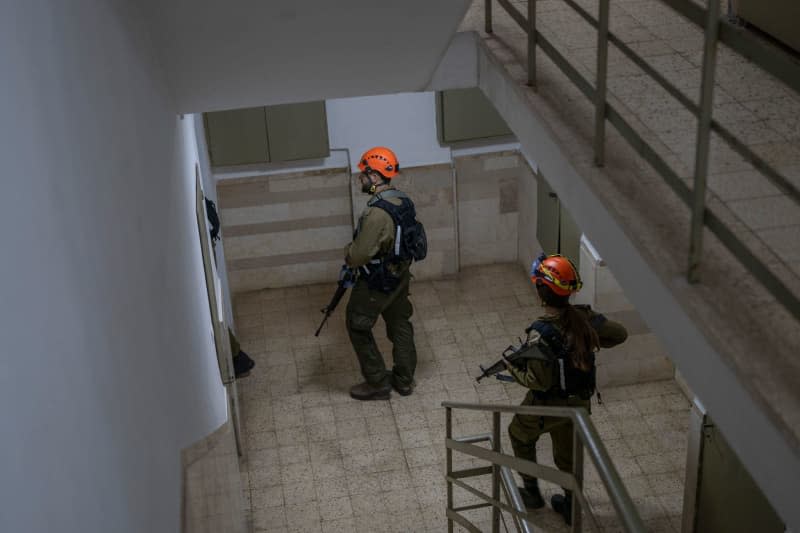The Israeli army reported on Tuesday it has intensified its ground offensive in southern Lebanon, while the Islamist Hezbollah militia said it launched numerous missiles targetting northern Israel.
The salvo was fired at various targets in northern Israel, the Iranian-backed militia said in a statement. The Israeli army said air raid alerts had been issued in several locations near the border with Lebanon.
About 135 rockets targeted the Galilee region of Israel and Haifa, Israel’s third-largest city, however, most of them were intercepted, the army said. Some missiles also hit the suburbs of Haifa, it said.
The Times of Israel described it as the biggest rocket attack on the port city since Hezbollah began firing at northern Israel a year ago.
A woman was slightly injured by shrapnel, the Magen David Adom rescue service wrote on the X platform.
Meanwhile, the Israel Defense Forces (IDF) said it deployed a fourth division in southern Lebanon in its fight against Hezbollah. A division is a large military unit composed of several brigades and typically includes thousands of soldiers.
Reports indicate that three other Israeli divisions are currently deployed in the central and eastern sectors of the front.
Hezbollah has been launching attacks on Israel for the past year, claiming it is acting “in solidarity” with Hamas in the Gaza Strip. The regular exchanges of fire have cost lives on both sides.
Israel’s current objective is to push the militia away from the border, allowing approximately 60,000 evacuated Israelis to return to their homes.
Another top Hezbollah commander killed in Beirut attack
The Israeli Air Force said Tuesday morning that it killed another high-ranking Hezbollah commander in an attack in Beirut.
It said Suhail Hussein Husseini died in a targeted attack on Monday. “Husseini played a crucial role in weapon transfers between Iran and Hezbollah,” the military said.
He was also reportedly responsible for distributing advanced weapons among units of the Shiite group and “for the budgeting and logistical management of Hezbollah’s most sensitive projects.” These included war planning and special operations against Israel from Lebanon and Syria, it added.
Israel has waged war against the Islamist Hamas and other groups in Gaza since militants carried out a brutal massacre in Israel that killed more than 1,200 people and took about 250 hostages.
According to Palestinian and UN figures, about 42,000 people have died since then.
Now, the conflict has spread to Lebanon, where Israeli forces have significantly intensified its airstrikes against Hezbollah, killing key figures in the militia’s leadership and launching a ground offensive.
Hezbollah supports ceasefire talks
Hezbollah’s deputy leader on Tuesday expressed openness to a ceasefire with Israel.
In a televised speech, Naim Qassem said he supported attempts by parliamentary speaker and Hezbollah ally, Nabih Berri to secure a truce for the fighting in Lebanon.
He said he trusted Berri in the negotiations. Berri has reportedly been holding truce talks with Arab and foreign officials visiting Lebanon since last week.
But Qassem also said, “If the enemy [Israel] continues its war, then the battlefield will decide.” Hezbollah would not beg for a solution. “We will continue, we will make sacrifices.”
At least 20 Palestinian fighters killed in Gaza
The Israeli army said on Tuesday that it had killed at least 20 armed Palestinian fighters in northern Gaza.
In the Jabalia region, where troops launched a new ground offensive on Sunday, weapons caches were also raided, with air support provided to ground forces, it said.
The IDF also reported ongoing fighting in central and southern Gaza. The information could not be independently verified.
UN representatives fear Gaza-like conditions in Lebanon
UN organizations fear that the people of Lebanon could face the same fate as those in the Gaza Strip in the face of the ongoing bombardments by Israel.
Jeremy Laurence, spokesman for the UN Human Rights Office in Geneva said the same military methods are being used in both war zones. “The devastation is beyond belief in Lebanon as it is in Gaza.”
Matthew Hollingworth, director for the World Food Programme in Lebanon said the organization currently supports about 200,000 people a day with food, and this figure is expected to increased to 1 million.
Hollingworth, who worked in the Gaza Strip until June, said that the people in Lebanon were afraid that what had happened to the people in Gaza could happen to them.
“It is on my mind from the time I wake until I sleep that we could go into the same spiral of doom,” Hollingworth said.
Red Cross flies more aid to Lebanon
The German Red Cross (DRK) said on Tuesday that it is flying further relief supplies to Lebanon.
A plane with 150 rescue backpacks for the treatment of serious injuries is on its way from Cologne to Beirut, the DRK said.
Hundreds of thousands of people have fled southern Lebanon due to the escalating conflict. Beirut has endured days of bombing, with residential areas also being hit.
Israel’s military accuses Hezbollah of using civilian homes to hide weapons, adding to the fear and desperation among the population, which is suffering from a lack of shelter.
More than 2,000 people have been killed in Lebanon since the escalation of confrontations between Israel’s military and the Hezbollah militia almost a year ago, and a further 9,800 injured, according to the Lebanese Health Ministry.









